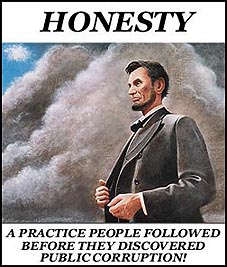Tuesday’s OpenCdA post titled Illinois Governor Arrested Today – Corruption had a link to FBI Special Agent Daniel W. Cain’s complaint and affidavit sworn in support of arrest warrants for Illinois Governor Blagojevich and his chief of staff John Harris. Item 6 on page 3 of SA Cain’s affidavit reads:
As officials of the State of Illinois, ROD BLAGOJEVICH and JOHN HARRIS each owe a duty of honest services to the State of Illlinois and to the people of the State of Illinois in the performance of their public duties. (emphasis added)
The phrase, “…owe a duty of honest services…” is more than elegant words in an affidavit. It is a requirement in the United States Code at Title 18, Section 1346 (18 USC 1346). That Section of the US Code is a partial definition of “scheme or artifice to defraud. It reads:
For the purposes of this chapter, the term “scheme or artifice to defraud” includes a scheme or artifice to deprive another of the intangible right of honest services.
It defines the term as it is used in 18 USC 1343 – Fraud by wire, radio, or television. These are included in title 18, Chapter 63, the mail fraud statutes.
In plain but oversimplified non-legalese, this means that if a public official who has a duty to the public uses the US mail or just about any telecommunications medium to help accomplish a fraud, the official can be accused in federal court of depriving another of the intangible right of the official’s honest services. Upon conviction, the accused official…
…shall be fined under this title or imprisoned not more than 20 years, or both. If the violation affects a financial institution, such person shall be fined not more than $1,000,000 or imprisoned not more than 30 years, or both.
Conviction is not certain. As shown in this paper and this one, there are legitimate concerns about ensuring officials are not prosecuted without the other elements of criminal behavior being present. But what should be very clear is that Congress intended for public officials to do their work honestly on behalf of all the citizens they represent.
So, next time you’re reading an article about the arrest of a public official accused of corruption, if you see the formal charges include mail fraud or wire fraud, look and see if somewhere in the affidavit there isn’t an allegation the official failed to fulfill “…a duty of honest services.”

